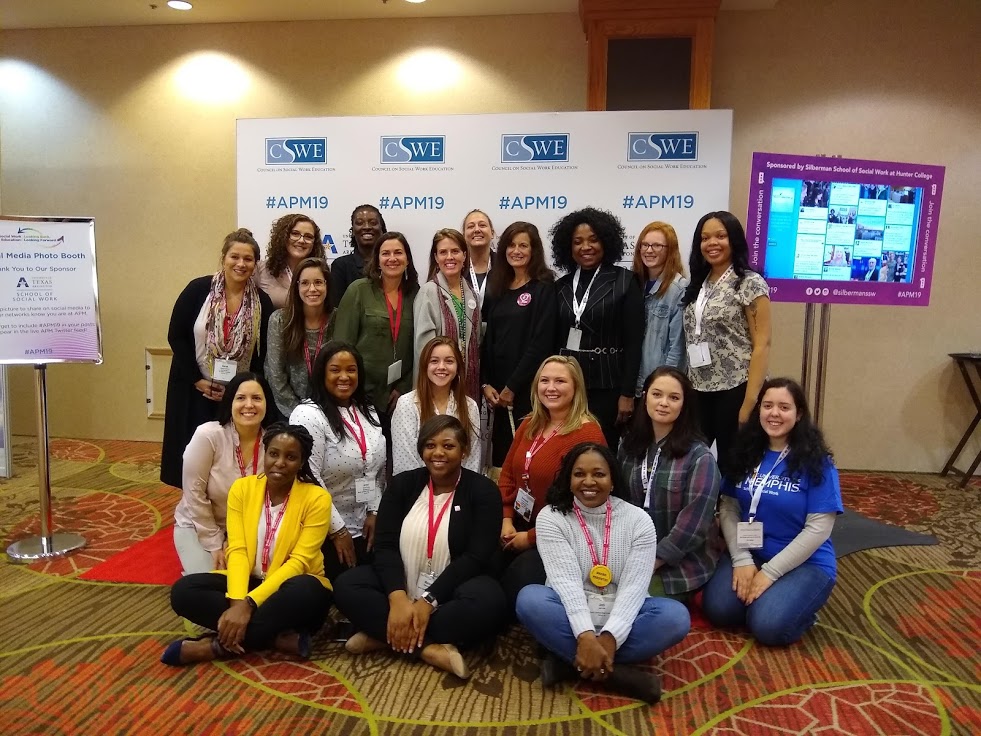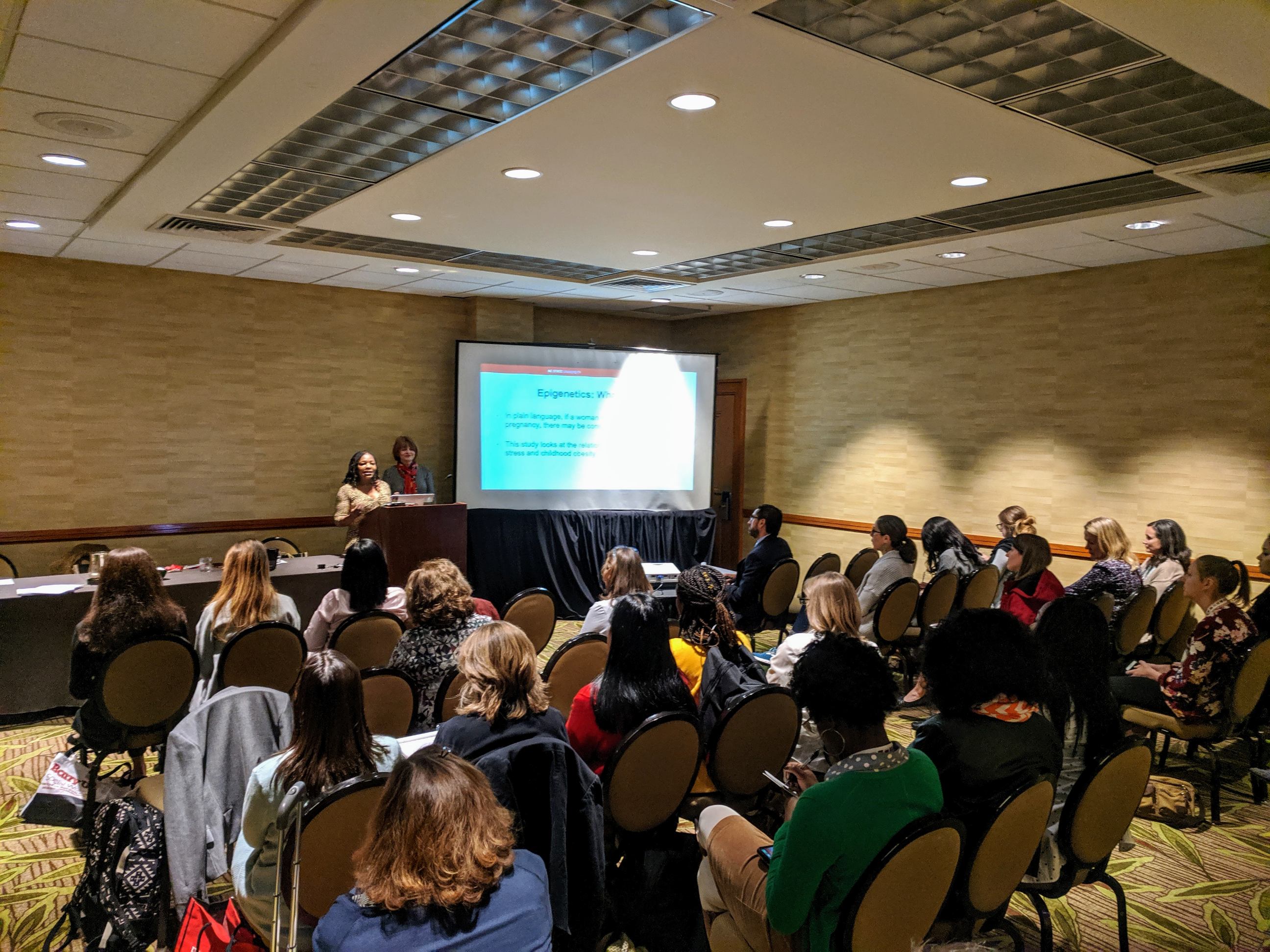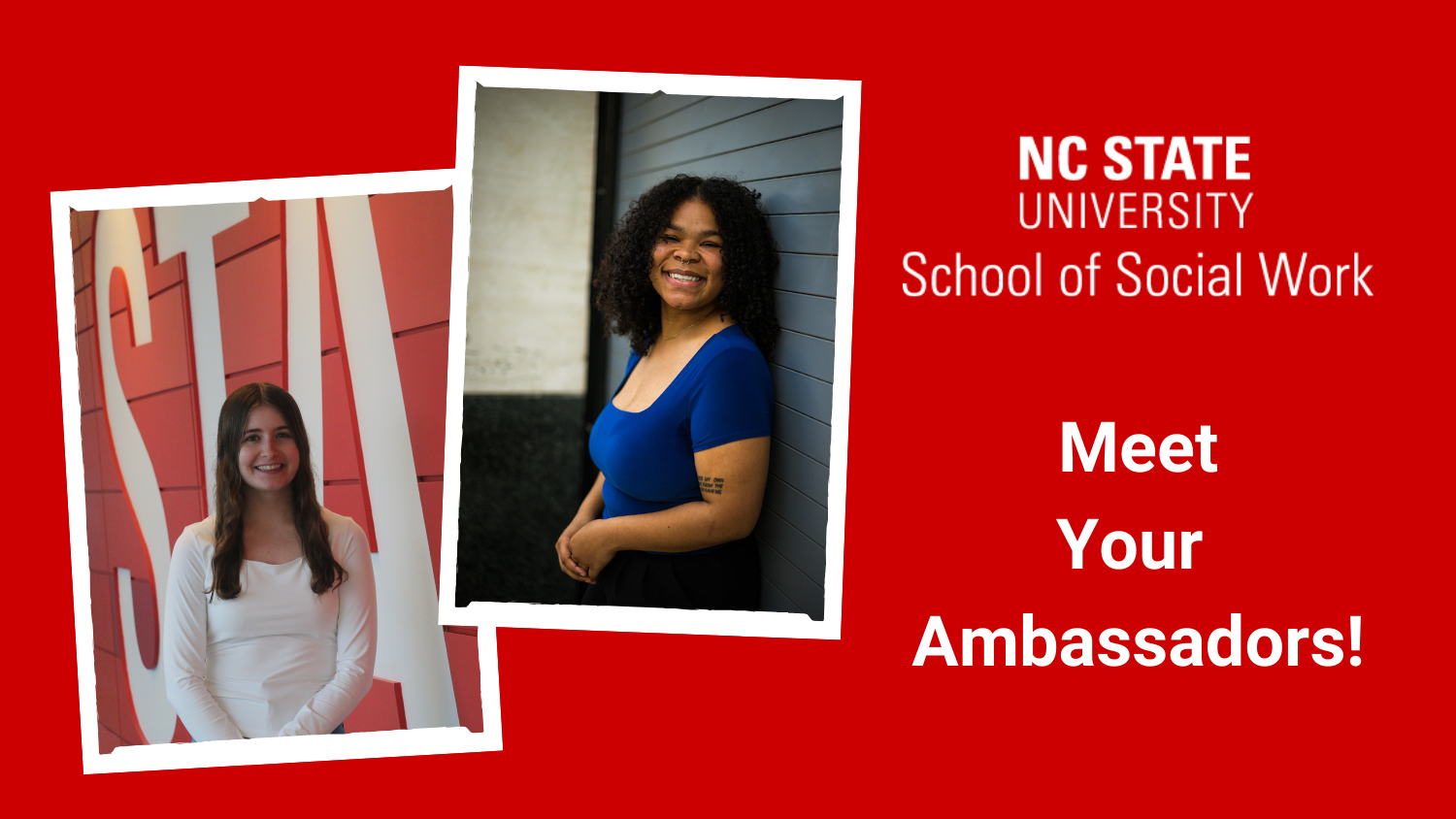Department of Social Work Takes 22 HRSA MSW Students to CSWE APM

From October 24 – 27, 2019 the 65th Council on Social Work Education (CSWE) Annual Program Meeting (APM) was held in Denver, Colorado. This year’s theme: Social Work Education: Looking Back, Looking Forward, drew social work faculty, practitioners, researcher, and professionals from across the discipline. Twenty-two Master of Social Work (MSW) students from NC State’s Department of Social Work. The students are funded scholars of two grants received by the department through Health Resources and Services Administration (HRSA). One grant, Behavioral Health Workforce Education and Training (BHWET) and the other, Opioid Workforce Expansion Program (OWEP) made it possible for these students to actively participate in the largest annual social work conference in the world. The students all served as CSWE student volunteers. This year NC State had the largest student volunteer contingent of any university.
The grant faculty led the charge to provide these 22 students with this learning and engagement opportunity to expand their knowledge on emerging issues and groundbreaking research and practice modalities in the behavioral health field. With social workers having travelled from far and wide to attend the conference, the experience was inspirational for the students who attended. The students also took advantage of the opportunity to discuss their own evaluation projects.

“Attending the CSWE conference was a major boost to my confidence. I did not feel as if I was a student in a big sea of professionals. I feel that I was treated as a peer to others who were in attendance. My ideas, and feelings about certain topics were acknowledged and valued.” – Arryn Dorsey
“It was such a great opportunity to learn and network and I am very grateful for the privilege. I learned a lot in the presentations I was able to attend and gained a lot of new knowledge.” – Anna Ashley
“I thoroughly appreciated the opportunity to attend the CSWE Conference in Denver. I never thought I would have the opportunity to attend something like this. I will forever remember this experience and utilize the things I learned about in practice. I am grateful for the friendships I also made during the trip.” – Sage Torrez

With graduation quickly approaching for these students, many used the opportunity to attend this conference to plan for their futures beyond graduation.
“The CSWE conference was an excellent opportunity to learn more about potential trajectories for my social work career. When considering the possibility of pursuing a PhD and perhaps teaching social work in a higher education setting, the conference was the ideal place to gain first-hand knowledge and perspective from esteemed colleagues and associates… I would argue that Graduate School is the perfect time to begin extending webs of communication with mentors, or those employed in desired settings, in an effort to start molding the pathway of our careers. The CSWE conference supported my sense of independence, and leadership and communication skills as I navigated conversations with fellow peers, mentors, facilitators and professionals in the social work field.” – Sarah Yenkeleun
“For me personally, I did not realize how much networking I would do at this conference. I am super excited about my future in this profession! I got to meet so many incredible social workers, and I felt at home in this environment. I also talked to [the University of] Alabama about getting my doctorate with them, which is an opportunity I would not have had without this opportunity to go to the CSWE conference.” – Summer Scardino
For several students, the trip to Denver, CO conference was the first time that they had visited the city.
“Denver is a beautiful city and I’m happy to finally visit it.” – Brandon Garrick

“Denver is much more progressive than NC. I knew this going there, but seeing it in person is quite different. It is a beautiful city with an incredible environment. There’s nothing quite like it!” – Mya Wrenn

The conference boasted many excellent workshops where experts shared their knowledge and experience in research and practice with attendees. NC State students even attended some of the sessions hosted by the Department of Social Work’s esteemed faculty.
“Dr. Cryer-Coupet’s workshop on engaging men and fathers in clinical practice was enjoyable. I also enjoyed the session on Black women’s hair in professional spaces. I enjoyed them both due to personal reasons as well as because they focused on a strengths-based approach.” – Dejanique Alexander
“I enjoyed all the workshops I attended and very pleased with the ones presented by our professors such as: Epigenetics by Dr. Hall and Dr. Ames; The marginalization of Fathers by Dr. Cryer-Coupet. The one that I took home was the presentation on Opioids that helped me with my research on Medication Assisted Treatment with concentration on Methadone.” – Ifeoma Ezuwgu
“I loved the workshop on Decolonizing Social Work – it is a particular area of interest and study of mine. I also appreciated the workshops I attended on islam, spirituality, and grief. These are topics that have not been covered in this way in my course work. It was very moving.” – Andrea Wallenbeck

Professional development opportunities like attending the CSWE Annual Program Meeting are not the only benefits HRSA scholars receive. HRSA supports interprofessional training in primary care and community based settings. These programs encourage an integrated approach to care and bring many disciplines together including social workers, physicians, nurses, psychiatrist, psychologies, pharmacists and paraprofessionals. Students are required to participate in behavioral health education beyond the classroom and must be engaged in a HRSA approved field placement. In exchange for participating in the program, scholars students receive a $10,000 stipend. NC State HRSA Scholars graduate prepared to immediately begin clinical work in medically underserved areas. The graduates continue to support the program for at least three post-graduation years by responding to surveys from the evaluators, Drs Alan Ellis and Qiana Cryer-Coupet. The results of the surveys provide long term program impact data.
“When I first learned about HRSA, I did not know all the opportunities that were about to come with it. I knew it was a scholarship that would help me advance in clinical practice, but I didn’t know how. I’ve received so many pertinent trainings that have taught me so much from such amazing speakers and clinicians. The scholarship has helped me focus on school so I do not have to work during, and allows me to not stress. It also provided me with an amazing field placement opportunity.” – Emily Sardinha
“HRSA has allowed me to be financially secure during my final year of graduate school, which really allows me to put more focus on my education and field experiences. HRSA also has connected me with many other professionals in the field to begin networking for my future.” – Charice Putnam
“HRSA workshops and opportunities have helped my education and career choices by allowing me to learn more about different programs and therapies available to the community.” – Vanessa Huther
Dr. Jodi Hall, the principal investigator of the BHWET and OWEP grants, stated that “attending the conference with the HRSA students was very rewarding. I would like to explore other opportunities to fund these high impact learning opportunities for students. Students and faculty gathered each evening to debrief, process, and share what was learned from workshops and other events that day. The students were eager to share and their excitement and appreciation were palpable. The faculty that participated in daily sessions with the students included Professor Sontina Barnes, Drs. Natalie Ames, Intae Yoon, Qiana Cryer-Coupet, and Sarah Ascienzo”. Hall further stated the faculty members were committed to making sure the students were integrated into the research and networking aspects of the conference. “It was a great integration of students and faculty in a professional setting away from campus. We all learned a lot from each other” Hall said.

The opportunity to participate in HRSA funded programs is available to year 2 and advanced standing students. The HRSA BHWET Program is coordinated by Professor Pam Wheeler and HRSA OWEP is coordinated by Dr. Jocelyn Taliaferro. Other faculty staff for these two grants include Professor Zelter and Drs. Nsonwu, Ames, Ascienzo, Stansbury, Cryer-Coupet, and Ellis.
For more information about applying to be a HRSA scholar visit our HRSA website!


